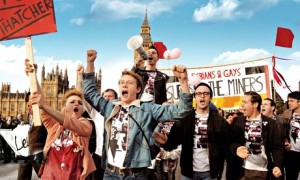‘Pride’: The first gay press review by Attitude’s Andrew Fraser

As unpromising historical fodder for mass appeal feel-good movies go, it probably doesn’t come more unlikely than the 12 months from the summer of 1984 to the summer of 1985 – one of the most toxic periods in British history.
As anyone who lived through it will attest, these were dirty, nasty, mean-hearted, shameful times, a visceral-Norman-Tebbit-gob-stain on the history of this country, with Margaret Thatcher at the helm – the woman who (and it’s hard not to cry) quoted St Francis Assisi at her ‘Coronation’ five years earlier. While Churchill no doubt whirled like a dervish in his grave, Thatcher whipped the country and the press into an orgasmic fury of hatred against the ‘enemy within’. This was the time of AIDS, mass unemployment and Heysel. Throw into this terrifiying tinderbox the Brighton bomb and – KABOOM! Intellectuals, single mums, working class football fans, people who believed in ‘society’, all were hated upon. But worst, most rotten, most hated of all – the biggest ‘them’ out of the ‘us and them’ were the miners and the gays.
Pride takes up the story of the time when these two communities-under-siege met. Amidst the craziness of the age, a group of London homosexualists, led by activist Mark Ashton, took it upon themselves to help defend one South Wales mining community, striking for its life. The concept, that ‘my enemy’s enemy is my friend’ was tested to the max when the LGSM (Lesbians and Gays Support the Miners) headed deep into the valleys – and were met, largely, with a Welsh chorus of barely-disguised embarrassment and abject horror. These gay London dandies were hardly any more enamoured of their new best friends.
As Director Matthew Warchus’s film splendidly and joyously recounts, however, prejudice melted behind the picket lines. Beautifully shot, contrasting gritty Brixton with a gorgeously desolate wintry Wales, to huge dramatic effect – Pride manages to be wonderfully life-affirming, and laugh-your-socks-off funny, while compromising none of its grittiness. AIDS casts its dark shadow over everything. The film does not flinch from the shocking sight of Thatcher’s private army of policemen battering their way through working class communities. Nor does it soft-soap the audience as those early Gay Pride marchers are drenched with abuse and phlegm, making their way through the streets of London. Pride brings home the freedoms we now take for granted, and the bravery of those who fought for them – in a way that no written piece of history ever could.
As deft a piece of film-making as you are likely to see, Pride never tries to disguise the naiviety and occasional shrillness of its gay protagonists – nor does it attempt to gloss over the boorishness of the miners, or attempt to portray them as sooty-faced-liberals-in-waiting. What it does do, in the most magical and funny way, is show that prejudice cannot survive proximity. Humanity wins. Two battered, bruised and bleeding people heal each other’s wounds through solidarity and friendship. And, of course, love.
It’s tough to pick out stand-out performances from an ensemble cast this good, with so many threads and stories interwoven so elegantly and coherently – but if we have to, Andrew Scott is dreamy and heart-breaking as Gethin; coming to terms with his home country Wales. Ben Schnetzer displays just the right combination of bolshiness and hurt as Mark, George MacKay is sweet and real as Joe – and Imelda Staunton, brandishing a large rubber dildo, puts in a performance of such passion, wit, humanity, strength and gentleness as Hefina that if she doesn’t go home with a cupboardful of awards, the world’s gone wrong.
If you have read the early reviews from Cannes, you will be aware that Pride is shaping up to be a monster film hit. Every superlative to be thrust its way will be deserved. Sure, this is a great gay film – and a vital depiction of our history – but yet, in so many ways, this isn’t a gay film at all. It’s a film about people being victimised who refused to be victims – a film about how, sometimes, even when you wind up on the losing side, you end up, ultimately being the winner. Pride does everything it needs to do, to do justice to its subjects –and yet still exudes massive mainstream appeal – think The Full Monty and Billy Elliot… and then some. Oscars surely beckon for the best British film in a decade. It’s a cliché but there genuinely was not a dry eye in the house. If you have tears, prepare to shed ‘em…
Rating: 5 stars
Pride opens in UK cinemas on September 12.


